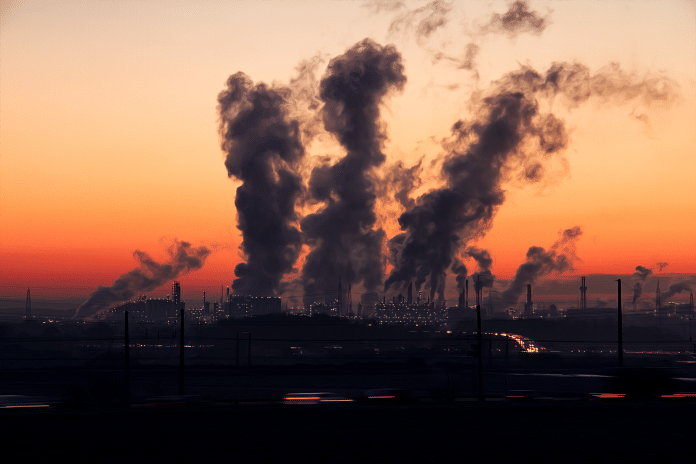Bengaluru: A unique observational study from the IZA Institute of Labor Economics in Germany has concluded that high air pollution and steep increases in Covid-19 infections in the Netherlands seem to be related.
The research is the largest and most comprehensive analysis on air pollution and Covid so far, and also factored in over 20 other parameters, including age, obesity, household size, population density, occupational risks, etc.
The study comes on the heels of many others that have pointed to the link between heightened air pollution and severity of Covid-19, both in terms of incidence and mortality. Researchers state that an increase of just 1 microgram per cubic metre of PM2.5 particles corresponds to a 16.6 per cent increase in Covid mortality.
However, many experts have also questioned the link, saying there could potentially be other explanations for the cases.
The authors of the IZA study have accepted that while there seems to be a pattern of increased incidence of Covid-19 with air pollution, they could not conclusively establish causation or state that more severe cases are a direct result of worsening air pollution.
Also read: Air pollution levels and Covid-19 mortality rate are linked, claims new Harvard study
Why the study was conducted in the Netherlands
The Netherlands offered a unique opportunity for the study, according to IZA researchers, since some rural areas tend to be more polluted than the environmentally conscious big cities due to large-scale livestock farming. Livestock farming is a known cause of large-scale air pollution and has a well-established link to respiratory ailments.
The team analysed data for 355 Dutch municipalities and found that, unusually, Covid hotspots were found more in rural areas than big cities, especially in places where fewer people live together. Media reports had indicated that in February and March, there were carnivals in these areas. But the researchers state that even when data is adjusted for the carnival, there is a potential role played by livestock farming.
The south-eastern Dutch provinces tested in the study are home to over 63 per cent of the country’s 12 million pigs and 42 per cent of its 101 million chickens. Intensive livestock production results in the production of large amounts of ammonia, which contributes significantly to air pollution. Concentrations of ammonia are the highest in air samples from the south-east Netherlands.
The IZA researchers found that an increase in fine particulate matter concentrations of 1 microgram per cubic metre was linked with an increase of up to 15 Covid-19 cases, four hospital admissions and three deaths.
Some experts have expressed scepticism, stating that socio-economic factors and transmissions through travel patterns could offer an alternate explanation. But many world leaders have already issued calls to curb air pollution to stop the spread of the pandemic in their countries.
Also read: Living in a city with high air pollution increases chances of being infected by Covid
Science of air pollution and Covid
There have been many studies in recent times that have alluded to the trend of severe Covid in polluted areas. A study of Covid fatalities blamed long-term exposure to nitrogen dioxide, a pollutant released from the burning of fossil fuels, coal, oil, and gas. It analysed fatalities in Italy, Spain, France, and Germany, and concluded that out of the 4,443 fatalities, 3,487 or 78 per cent were in regions with highest NO2 concentrations, combined with lower wind flow that prevented dispersion of pollutants.
Other studies in polluted regions of countries like Italy too indicate high levels of Covid-19 coinciding with air pollution.
Scientists in Italy were the first to find out that the virus attached itself to airborne pollutant particles (although there is no direct evidence yet that they transmit this way). The analysis was performed on 34 samples of particulate matter PM10 in February and March. Previous studies have shown that microbes are experts in hitching rides on suspended particulate matter.
Pollutants have been known to prolong the duration of ventilation in intensive care patients even without links to Covid. Air pollution is well-linked to a negative impact on immune system, and to both inducing and worsening of other breathing and respiratory ailments like asthma, wheezing, or lung cancer. Air pollution also contributes indirectly to the disease burden by primarily helping feed cardiovascular diseases as well.
Studies in India
Studies in India too suspect that air pollution might be exacerbating the effects of Covid in some parts. A much-publicised Harvard University study determined that an increase of 1 microgram per cubic metre of PM2.5 particles in the air corresponded to a 15 per cent increase in Covid deaths.
The Indian subcontinent is also exposed to indoor air pollution or household air pollution, with studies and health agencies like WHO pointing out that 98 per cent of India’s children are exposed to pollutants.
Also read: Delhi and Mumbai’s high Covid tally linked to severe air pollution levels, say experts



